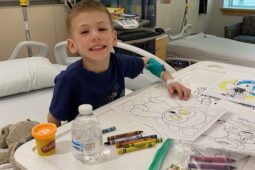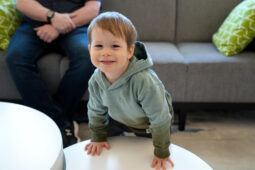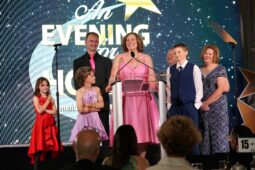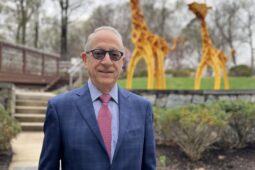Family With Three Boys With Mastocytosis Looks to the NIH for Answers
What’s the likelihood of lightning striking twice, medically speaking? That’s the question Mercy and Jay hope the National Institutes of Health can answer for them.
For Mercy and Jay, finding out they were expecting their first child was one of their happiest moments. But their hopes were soon darkened by grim medical predictions made based on early ultrasounds. Their unborn child had physical malformations, and his brain looked unusual on the ultrasound. Doctors warned their son might not live.
“Grizzly was born with club feet and only one kidney,” said Mercy.
Grizzly may be an unusual name for a child, but it’s a fitting one for a baby boy who mustered up the determination and strength to survive multiple serious physical health issues. All in all, he needed nine surgeries: surgery to correct his feet, surgery for a tethered spinal cord, and risky brain surgery to insert a stent in his brain for a tumor he developed, among others. Like his dad, Grizzly also has hearing loss.
While learning to care for Grizzly, Mercy and Jay found out they were expecting again. This time, ultrasounds came back normal, and the family breathed a sigh of relief. Baby Lincoln looked happy and healthy.
But a few months into Lincoln’s young life, just as the family was in the hospital for their firstborn’s spinal surgery, family members watching Lincoln updated the couple that their second son had suddenly developed large, unusual blisters all over his body. He was immediately admitted to the same hospital as Grizzly, and the two brothers shared a room.
Testing revealed Lincoln had mastocytosis, a rare mast cell disease that typically resembles a mild or severe allergic reaction of the skin but can also cause abdominal issues and other symptoms. Mercy and Jay were given medication to manage their son’s illness and sent home.
While pregnant with Titus, their third child, Mercy again underwent rigorous prenatal testing that came back normal. Nonetheless, at just 2 months old, Titus also developed a form of mastocytosis.
The number of rare disorders experienced by the boys led doctors to send the family to the National Institutes of Health for evaluation. Genetic testing revealed Jay, Grizzly and Lincoln have the same genetic mutation, causing Axenfeld-Rieger Syndrome in all three, which mostly affects the structures of the eye, teeth and face. However, genetic testing for known mutations in the KIT molecule, which is associated with cutaneous and systemic disease, did not reveal a mutation causing the two distinct forms of mastocytosis in Titus and Lincoln.
Still, to NIH researchers studying mastocytosis, the boys are unique in that they’re the only reported siblings to have two distinct forms of mastocytosis in one family.
Despite their health issues, Grizzly and his siblings are doing well today. The family hopes that by participating in genetic and mastocytosis studies at the NIH, researchers will be able to develop ways to better treat future generations of children and families with rare illnesses. This is also of great importance to the family as many genetic issues can be passed on to future generations.
“For me, the NIH means hope,” Mercy said. “Hope for a cure some day, hope for more information to help us learn to deal with these diseases – just hope for patients in the future who have these rare diseases who are searching.”
But coming to the NIH isn’t easy for the family who lives in Washington state and has to fly in to participate in research protocols, and who has to also keep up with intensive follow-up with the specialists at Seattle Children’s Hospital.
“I can tell you right off, the kids wouldn’t get on the plane if it wasn’t for The Children’s Inn,” Mercy said.
Grizzly, Lincoln and Titus love the large outdoor playground as well as the indoor play space with a treehouse and plenty of interactive toys, including a video game that projects onto the floor, large interlocking bricks, drums that can be played so loudly, they can be heard throughout The Inn, scooter cars and much more. The play spaces are perfectly designed for the boys to run around, chase after one another and let off steam after long days of participating in medical testing.
“It [The Inn] just balances things perfectly,” Mercy added. “At the hospital, doctors are poking and prodding them all day, and then they get back to this place, which is like a kid’s paradise. It’s incredible. It really is. It’s a lifeline for our whole family. It makes everything worth it.”




